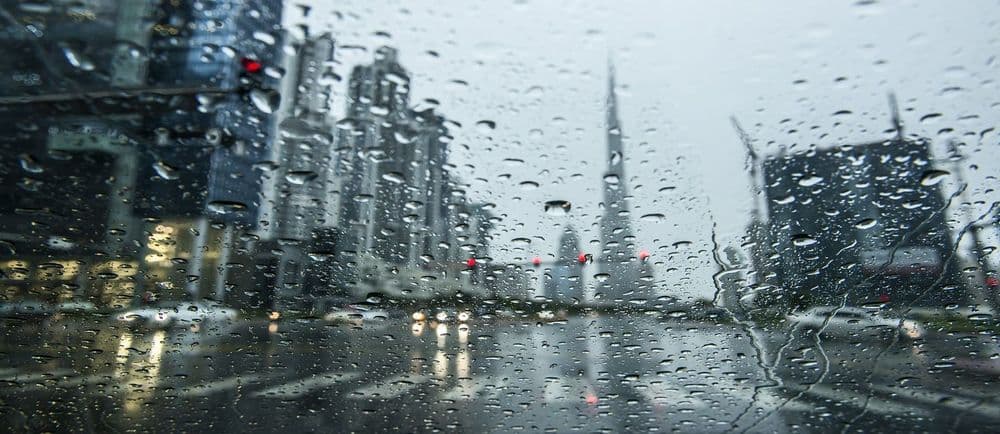Dubai rains: How to dry your home out after a leak or flood?
Wednesday 17 April 2024Wed 16 Feb
Share

While the sunny desert does have its good moments, yesterday the UAE experienced the strongest rains, winds and hail across the country in over 75 years!
A year’s worth of rainfall was seen across the country, with flash flooding, power outages, pipes bursting and all kinds of damage - the country is recovering from one of the toughest storms and weather challenges seen in the UAE to date.
While authorities have urged all residents to stay home and maintain safety precautions due to flash flooding across the country - many residents have faced terrible damages and leakages in their homes and these damages, if not attended to, can also lead to the growth of mould and cause serious structural damage.
Let us help!
At Allsopp & Allsopp Home Maintenance, our teams are on hand and have rounded up key steps you can take to reduce dampness and long-term damage to your home…
After the flood - how to maintain safety measures:
This morning, we suggest and urge all residents to check for these signs to ensure you stay safe after a flood:
-
Remember to wash your hands thoroughly after any contact with floodwater, as it may contain sewage, chemicals, and animal waste. And make sure to use gloves, safety glasses when cleaning.
-
If you notice any changes in the colour, taste, or smell of your tap water, refrain from using it.
-
If you're using generators to power your home, avoid using petrol or diesel-powered generators indoors, and try to keep it outdoors.
-
Hold off on starting repairs immediately; as water can go into sockets, gas lines, etc, it is better to have a specialist on the line - Call our Home Maintenance team if you need help!
How to dry out your home safely from flooding
If you have experienced severe rain damage seeping into your homes, or have seen your gardens, balconies or garages get flooded - here are some steps to follow to dry out your home.
Assess the damage around the property:
You want to start by looking around to see where the damage has been the most and assist what can be repaired. Many home floods can be fixed up with pumps, wet/dry vacuums, or buckets to remove standing water.
If you live in a villa, this will be easier for you but make sure you are cautious of electrical appliances and outlets when using electrical equipment to pump out the water.
Dispose of contaminated items:
Many folks do not know that rainwater can carry chemicals and currents that can be very dangerous, hence it's very important to discard any items that cannot be salvaged, especially porous materials like carpets, mattresses, and upholstered furniture that may harbour mould and bacteria.
Dry/drain out the space:
If there isn’t too much flooding in your property, you can also start by opening doors and windows to ventilate the area, and mop your floors towards drains within your home to dry out the space. Fans, dehumidifiers, and air movers to increase airflow can speed up the drying process. Focus on areas like walls, floors, and ceilings.
Try to remove damaged materials:
If you have wallpapers, drywalls or artificial flooring in your home, make sure to remove it as water can seep through that and cause mould growth and structural damage.
Seek professional help:
If the damage is extensive or if you're unsure about handling certain tasks, our Home Maintenance team is available on hand to help out - get in touch with us!
Got leakages? Here’s what you can do:
If you have faced minor damages and are having leakages around the house, to avoid any further damage you could take these steps:
Identify the source and contain it:
The easiest way to fix up a leak is by locating the source of the leak. Check ceilings, walls, windows, doors, and the roof for signs of water intrusion such as water stains, dampness, or dripping water.
Place buckets, pots, or towels under the leak to catch dripping water and prevent it from spreading further. If the leak is coming from a pipe, turn off the water supply to that area until repairs can be made.
Seal windows and doors:
Since a lot of the damage has occurred from entrances, balconies and windows, inspect them thoroughly for gaps, cracks, or damaged seals. You want to take the help of temporary sealers, mount tape or putty to seal them off till they can be repaired properly.
Check plumbing fixtures:
One of the main things to do is to inspect plumbing fixtures such as sinks, toilets, and showers for leaks or drips, as very commonly from rains, pipelines can be affected.
Hope this helps!
And if you need us - we’re always on hand from carpentry, plumbing, and electrical fixtures to painting.
Drop us a line - here.
